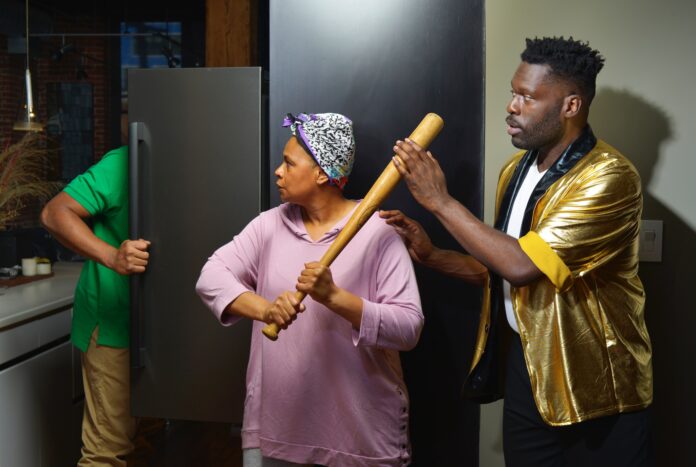As Pulitzer-prize winning playwright James Ijames’ “Fat Ham” makes its Broadway debut, his latest work, “Abandon,” will make its world premiere at Theatre Exile from April 27 to May 21. Created in partnership with Theatre Exile through their New Play Development Program, Studio X-hibition, “Abandon” follows a young man, Joshua, who breaks into the home of an older woman, Luella, after being kicked out of the house by his brother. In addition to grappling with her new house guest, Luella must also confront the ghost of her late son, Gabriel, who she can’t let go. As the story progresses, the spiritual and emotional journey of each character allows them to reckon with their pasts and break free of their isolation.
Playing the role of Gabriel is Brenson Thomas, a queer writer, actor, theater-maker, and a graduate of the Sarah Lawrence College MFA Theatre program. He has written on shows including “Twenties” on BET as well as plays including “What We Lost & Never Knew.” Thomas spoke with PGN about “Abandon” and the role writing plays in the theater. This interview has been edited for length and clarity.
Tell us about “Abandon” and what drew you to it?
“Abandon” was written by James Ijames. And with a lot of James’ plays, I think that he writes contemporary Black characters in this very realistic sort of way. His characters are usually in need of something, they’re facing some sort of large challenge. And in “Abandon,” Luella and Joshua both need something. Luella lost her son years ago, and her son is actually a ghost and has been watching her connect with Joshua. And Joshua comes from a disturbing home life as well. So it’s about these two characters who are grieving and who are dealing with their own traumas, and they find solace in each other. What drew me to it is James. I’ve always admired his work. He’s a really close friend of mine as well. And I’ve never gotten to do one of his plays. So when Theatre Exile approached me with the opportunity, I was really excited to do it. And last season I did a production with Melanye Finister, who plays Luella, so I was eager to work with her again. And [director] Brett Ashley Robinson is a close friend and collaborator as well. So when I found out that she was directing it and James and Melanye were part of it as well, I jumped at the chance.
Your character Gabriel is a ghost, but it sounds like he does more than just float around on the ceiling. Tell us more about him and the role he plays in the story.
Gabriel is really, really interesting because in his living life he was a singer and a cabaret performer, so there are times in the play where we get to see glimpses of that. I do get to sing some songs, and also I think the connection between Gabriel and Luella is really rich and really fascinating because she just can’t let go of him. And so there is something about him being there watching her and trying to help her move on. But also, there is a kind of, I’ll say, codependent relationship between them. There are times when Luella can summon Gabriel, and then there are times when Gabriel is just there. They just go about their days together. But when Joshua comes in, I think Gabriel is a bit jealous, but I also think that he is happy for his mother to have someone there for her too. It tends to be a bit bittersweet because he finally gets to see his mother move on, but also knowing that he’s not the only thing in her life is something that Gabriel has to kind of reckon with as well.
There’s a still photograph from the show, right after the break in, where your character is almost holding your mother back from using a baseball bat against him. What’s the symbolism in that act? Helping her be a better person?
Luella is a very tough old lady. There’s a line in the play where she says she is a “formidable old hussy,” and she will swing the bat at whomever she feels if she feels threatened. And I think that there is a form of protection there from Gabriel, but also in those scenes he actually does act a bit more like a cheerleader, like he’s telling her to stand up for herself and to not let someone else come into her house. I think I think he also does that because he knows that she may not necessarily be in as much danger as she thought. But there’s definitely some fun antagonizing that happens on Gabriel’s side. And yeah, he’s also watching over her throughout.
There’s a line from the press release of the show. “Abandoned conjures a thin veil that separates the worlds of the living and the dead.” I think that’s something that a lot of people don’t realize, that we’re more connected with people we’ve lost than we believe. What does the play say about that?
James is so interested in this reality, this surreality of life and beyond life, and with “Abandon,” that thin veil is so evident. And I think what James is trying to say and what we’re exploring in this production is one character’s journey of grief but also how, when we do lose people from this earthly plane, their spirits are carried with us, whether that be through us not being able to let go because of guilt, or trauma, or other things. I think it’s about the characters reconciling their past, their life here on Earth, and what was lost with their spiritual self. Luella is a character that seems to be stuck. And I think Gabriel is trying to push her through this very stagnant state, and I think he is able to be there and be more present because of her unwillingness to let him go. And so that veil between the living and the dead is lifted, because I think there are several times throughout the show where you’re not quite sure what is real, what is memory, and what can be conjured. So there’s a really interesting interplay between reality and surreality.

As a writer yourself, can you talk about the importance of writing and the role it plays in theater?
It all starts with the words. It all starts with the script. And I think as an actor, you really just have to go off of what’s on the page. And with “Abandon,” James’ words are so rich, the text is so rich, and the stage directions are very poetic but also leave a lot of room for interpretation. And so I think the writing gives actors a really great blueprint to start off of and to build from, and one which we can continually mine and view as a guide throughout the process. So many questions will tend to come up when we start digging more, but the answers are usually already in the script. Whether it’s something a character says or something that’s in a stage direction, there always seems to be a guide there. It’s really fulfilling to work on something that is so deeply layered. “Abandon” is a great gift because the text is really rich and it gives us a lot to do and a lot to discover.
You were born in Georgia, but you seem to really love Philly. What about the city draws you in?
Other than a two-year break for grad school, I’ve been here since 2011. And I think Philly is very accessible. Almost any type of person can come here from any sort of background, and it feels very welcoming for people from all different types of life. And I think what is so great about Philly is that it isn’t New York; we have our own identity. I love the blue collar, rough and tumble feel; I love how passionate we are. And I absolutely push back against this idea that Philadelphians are rude or mean, because we absolutely care about one another. We’re not going to be fake, but when you need help, there is a community of people willing to help you.
For more information on “Abandon,” visit theaterexile.org/.

